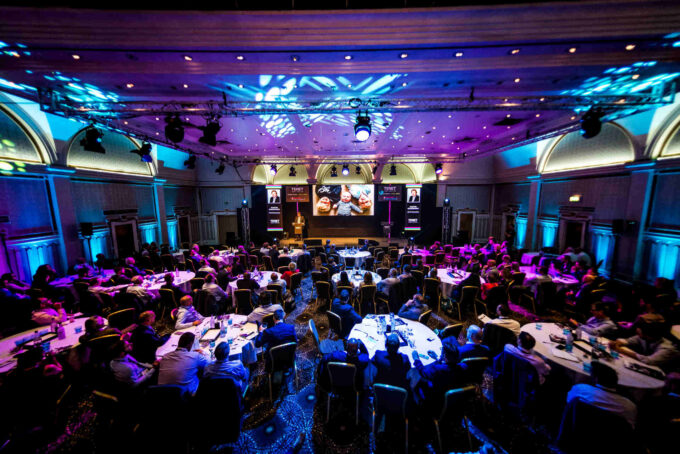A corporate event is an event that is organized in a professional environment like companies and offices. It is a professional event that requires planning and execution. Companies organize a corporate event when there is a need to inform the staff of new development. The development can be a new strategy, unveiling a new product or service, or rewarding staff or customers.
Planning a corporate event cannot be done without employing professionalism. It is a long-term planning that involves several stages before execution. Most times, companies and organizations employ professional event managers to handle the planning. Online management, like nstands.com, is also notable for exceptional corporate event planning.
Types of Corporate Events

In planning your corporate event, there is a need to understand the type of event it is. Corporate events can be classified into different types. Understanding the type helps guide the effective planning and mobilization of resources. A corporate event can be classified into the following;
Large-Scale Corporate Event
This significant event has a targeted audience of about 10,000 people. It might also be an event taking two days or more. Online registration, reservation of hotel rooms, logistics, and delegates’ movement are part of the planning.
Mid-size Corporate Event

This event can take up to 1000 delegates. It can be a summit or organizational get-together. Registration, pre-event communication, and reception are part of the planning.
Small Corporate Event
This event has an audience between the range of 100 to 250 people. It can be a seminar, workshop, or departmental briefing. Registration, breakout session, and lunch are part of the planning.
Micro Corporate Event
This simple event is planned for an audience of 100 people and below. It can be a training session or executive meeting across departments. Planning must include registration, breakout session, and refreshments.
Essential Tips in Planning any Corporate Event

Planning a corporate event is not a simple task that can be done illogically. It takes the expertise of a professional event planner to plan one.
You can consult nstands.com for a perfect plan for your organization’s corporate event. However, the following are tips that can help you in planning your next corporate event;
1. Define the Goals and the Objective of the Event
The most important thing for planning is the goals and objectives of the event. To accurately plan an event, the purpose of the event must be known. It will act as the result on which every other activity in the planning will focus. These goals will also serve as the yardstick to measure the success of the event.
An event planner must have a clear and definite objective of the event. In a corporate setting, an event’s objective can be to implement a new strategy, unveil a new product or service, change customer’s perceptions, communicate the company’s new marketing goals, and reward clients or exceptional staff.
2. Create a Team and Delegate Responsibilities

After you might have defined your corporate event’s objectives and goals, you will need to identify actions that need to be carried out to achieve the goal. Create a team of experts who will help handle the execution of each activity on the project timeline. Each team will be assigned responsibility and a deadline for it to be carried out.
It will not only ease the burden on the team lead but will also save time and human energy. It is also a way of discouraging the inadequacy and ineffectiveness of human labor. As such, delegating responsibility to the team is vital to achieving a successful corporate event.
Activities like online registration, booking and reservation of hotel rooms, media and publicity, and some other core parts of a corporate event can be delegated to expertise in such a field.
3. Set Deadline for Planning and Preparation
Since there are now many people working with you to achieve a common goal regarding your corporate event, you need to set a deadline for achieving each plan.
Schedule a timeline for each team to finish the task being assigned to them. The team needs to report to you or the team lead for evaluation and ratification.
The earlier this is done, the faster you can identify the perfection and the planning flaw. This strategy will give room for improvement in areas you deem it fit.
On this note, each member of the team must be aware of the deadline for their activity. They must also understand the need to comply with the deadline.
4. Adopt Technological Tools Where Necessary

Technology is a tool you can’t do without both planning and executing corporate events to deliver effective results in aspects like registration, media, and publicity. There is a need to adopt technological tools and expertise.
Manual registration can be tedious, ineffective, and prone to error. However, making use of an online registration platform can make it easier for the delegates. It will also make it easy for you as the planner to access the information and make rational decisions. Publicity and consequent information can be passed using mediums like social media and emails.
5. Have A Backup Plan and Entertain Feedbacks
Planning a corporate event is a combination of human effort and tools. There are chances that errors can occur in operation due to unforeseen circumstances. Therefore, a backup plan should be set aside for irregularities and the sake of improvement and consequent events.
The audience or the organizers should be asked to give feedback as regards the event. It will serve as an aid in improving the result delivered in the next event.
Conclusion

Corporate events are more technical in planning and execution. It is a project that requires more professional planning. However, following the above tips can help you achieve the best result in your corporate event planning.








